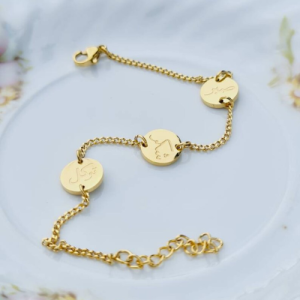Description

Wearing an Ayatul Kursi bar necklace is a popular way to display a verse from the Quran as a piece of jewelry. Wearing an Ayatul Kursi bar necklace can serve as a reminder of the importance of faith and can provide a sense of comfort and security. The necklace can also be a conversation starter and a way to share the beauty and significance of Islamic teachings with others.
When wearing an Ayatul Kursi bar necklace, it’s important to treat it with respect and reverence. Muslims should remove the necklace before performing any religious rituals or entering the bathroom. Additionally, the necklace should be stored in a clean and safe place when not in use.
Islam jewelry is becoming increasingly popular for several reasons:
- Cultural and Religious Significance – Islam jewelry often features symbols and phrases from the Quran, which hold deep spiritual and cultural significance for Muslims. Wearing Islamic jewelry can serve as a reminder of one’s faith and can provide comfort and protection.
- Fashionable and Trendy – In recent years, Islamic jewelry has become more stylish and trendy, appealing to both Muslims and non-Muslims. Many jewelry designers are incorporating Islamic symbols and phrases into modern and fashionable designs, making them more accessible and attractive to a wider audience.
- Online Accessibility – The rise of e-commerce has made it easier for people to access and purchase Islamic jewelry from around the world. Online marketplaces and social media platforms have also provided a platform for small businesses and independent designers to showcase their unique Islamic jewelry designs.
- Gift Giving – Islamic jewelry makes a thoughtful and meaningful gift for loved ones on special occasions such as weddings, birthdays, and Eid. Many people are also choosing to gift Islamic jewelry to non-Muslim friends and colleagues as a way to promote cultural awareness and understanding.
Cape Town is a city in South Africa that has a significant Muslim population. One of the most well-known Muslim areas in Cape Town is the Bo-Kaap neighborhood, also known as the Cape Malay Quarter.
Bo-Kaap is located on the slopes of Signal Hill and is known for its brightly colored houses, steep cobbled streets, and rich cultural heritage. Today, Bo-Kaap is a vibrant and bustling neighborhood, filled with mosques, Islamic schools, and traditional Cape Malay cuisine.
Other areas in Cape Town with a significant Muslim population include Athlone, Mitchell’s Plain, and Surrey Estate. These areas have a strong Islamic identity and are home to a variety of Islamic institutions, including mosques, schools, and community centers.








